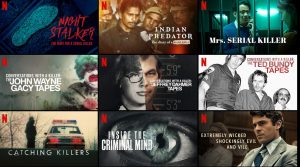
by Logan Harms
Gruesome and appalling murders have often been a focal point of human entertainment. Infamous criminals like the Zodiac Killer, Jack the Ripper, and Ted Bundy are common household names. It’s natural to be curious about their lives and how they became who they are. At what point does this introspection into psychology and nurture vs nature become a dangerous infatuation?
For the most part, it would seem that the general purpose behind most serial killer documentation is just that: to document and inform, but when we take a closer look, it seems that information might not be the only true purpose. In the 2002 Ted Bundy movie, Bundy is described as “good-looking,” and in The Ted Bundy Tapes, he is described as a “handsome devil.” This idea is further developed through the actors who portray Bundy like Mark Harmon, Corin Nemec, and Zac Efron. Using attractive celebrities makes viewers drawn to the character. This subconscious attraction romanticizes the character, which in these cases are real or fictional serial killers. Bundy isn’t the only romanticized killer; in the popular dramatic horror movie American Psyco, Patrick Bateman is a “handsome, young urban professional” by day who brutally murders people by night. Jeremy Renner, Leonardo Dicaprio, and Matt Damon along with other famously attractive actors have all played twisted, horrific people.
There are multiple examples of people who have become obsessed and fallen in love with real serial killers. Ricardo Leyva Muñoz Ramirez, also known as the Night Stalker, is a prime example. The City of Lof Angeles spent $1.8 million on his case because they had to go through more than 1600 prospective jurors due to bias. People would come to his trials just to give him gifts and letters and tell him they loved him. Likewise, Charles Manson was so charismatic that people would even kill for him. Ted Bundy’s court would be packed with women, and even Jeffery Dahmer received hundreds of letters and gifts.
Regardless of the atrocities these people committed, viewers try to rationalize the idea that someone could be so passionate that they would murder someone, so they become desensitized to murder. This rationalization is further amplified when the killer is the main character of a TV show or movie. When we are put behind the eyes of a killer, we put ourselves in their position, and we innately root for the main character. We rationalize their actions, and eventually, the rationalization turns into sympathy. As we see their bloodlust evolve, we feel bad for them, we accept what they’re doing as less horrific, and an infatuation with the character might grow.
As a society, “we have romanticized the idea of romance, and it is cancerous.” From a young age, we are taught that life is about falling in love – that love is the most powerful thing – and that is why we are so infatuated with serial killers. People search for the same undying love that Romeo had for Juliette, but with that kind of love comes obsession. Romance movies and dating shows are boring, fake, and passionless, but Ted Bundy is full of passion. Psychopaths are thrilling, creative, and ambitious, but more than anything, they are passionate. These underlying fantasies and characteristics are where the problem starts. People, desperate for some type of passionate undying love, become attached to the interesting and attractive psychopaths on TV. They become attracted to these killers, and when it’s time to find a partner, they are drawn to controlling, maybe even abusive people. He doesn’t let you talk to other guys? He doesn’t let you go out? It’s because he “loves” you so much. This is why romanticizing serial killers is so dangerous.
When you zoom out on the whole dilemma you can start to see how the romanticization of murderers promotes desensitization and sympathy, which abuses society’s interpretation of love, and encourages toxic relationships. Directors are extolling murder and glorifying terrible people. I’m not saying we should completely halt the production of this type of media because psychology is an important field that entertains and teaches people, but I am saying that we should stop casting beautiful actors to play serial killers, and we should stop romanticizing them.











